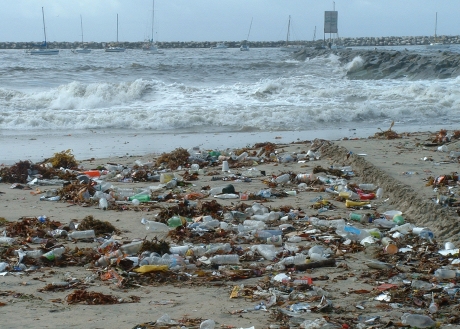Marine debris can be dangerous for wildlife, damage sensitive habitats, and create safety and navigation hazards. But marine debris can also hurt the economy. Marine debris can keep tourists away from beaches, compete with active fishing gear, and reduce commercial catches.
How does marine debris impact the economies of coastal communities?
In the United States, the tourism and recreation sector is the largest employer in the ocean and Great Lakes economy. Marine debris littered on beaches can not only degrade the beauty of the environment but may also prevent tourists from spending their time and money in coastal communities that rely on tourism. Local governments and volunteer organizations also spend their limited resources to clean it up.
Marine debris can decrease the number of days visitors spend on beaches, resulting in fewer tourism dollars spent and thus decreasing local jobs. A NOAA-funded study found that doubling the amount of marine debris on beaches in coastal Alabama resulted in an estimated decrease of 1 million visitor days, a loss of $113 million tourism dollars spent in communities, and a decrease of nearly 2,200 jobs.
On the other hand, decreasing marine debris on our shorelines can increase tourism-related spending and jobs. For example, the study found that reducing marine debris to almost zero in Ohio was estimated to produce an additional $217 million tourism dollars and over 3,700 jobs.
With support from the NOAA Marine Debris Program, a multi-faceted education campaign with The Ohio State University is tackling marine debris prevention with visitors to a popular tourist destination – South Bass Island and the village of Put-in-Bay, Ohio. By preventing single-use items from entering Lake Erie, tourists will benefit both the natural environment and the tourism industry by keeping island beaches and natural areas free from debris.
How do the economic impacts of marine debris affect me?
Marine debris on beaches could also be costing you money. In a study funded by the NOAA Marine Debris Program, it was found that the presence of debris on beaches influences our decisions to go to a beach littered with debris, or spend money seeking out a cleaner spot. The study surveyed residents in Orange County, California, to understand what features are most important when they consider visiting a beach. Some of those factors include a scenic view, convenient parking, the distance from their home, and whether or not the beach is suitable for recreational activities like surfing or fishing. However, most important to residents was that no marine debris is on the beach and the water is clean.
In order to find a clean beach, residents of southern California find themselves travelling farther from their local beaches and spending more money. Overall, this results in losses of millions of dollars to beachgoers every year. By reducing marine debris on beaches by just 25 percent, Orange County residents could save roughly $32 million during summer months by decreasing travel distances to enjoy the beach.
Read more at marinedebris.noaa.gov.

